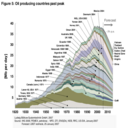Camp 2011 - Version 1.4
Chaos Communication Camp 2011
Project Flow Control
| Speakers | |
|---|---|
|
|
Frank Rieger |
|
|
Rop Gonggrijp |
| Schedule | |
|---|---|
| Day | Day 1 - 2011-08-10 |
| Room | Baikonur |
| Start time | 19:30 |
| Duration | 01:00 |
| Info | |
| ID | 4459 |
| Event type | Lecture |
| Track | Society |
| Language used for presentation | English |
| Feedback | |
|---|---|
|
Did you attend this event? Give Feedback |
Transition Telecom
Telecommunications and networking during energy descent

We'll need to come to grips with the challenges that declining oil production and increasing temperatures present. This talk explores positive future scenarios for the world of networking and communications past the great global energy free-for-all.
"Business-as-usual" and "surely-they'll-think-of-something" scenarios are increasingly for dreamers. The time of perpetual growth is over and the cracks are beginning to show everywhere. But let's get past doom and gloom: there's a growing movement that acts to prepare themselves and their communities for "energy descent": cold turkey while kicking the oil habit.
Too many are stuck thinking the future is either going to be apocalyptic or very much like today. (Both futures conveniently have in common that you don't have to do all that much.) In so-called Transition Towns, groups of inhabitants are working together to rethink the future of agriculture and land-use to effectively re-localize food, goods and services. All over the place, people are thinking, acting and (importantly) having a good time doing so.
This talk will explore a number of future scenarios and try to assess the impact on the world of computers, networking and telecommunications. Most people in this transition movement are inspired (but not blinded) by technologies and methods from a time past. Modern communications technology has no set pre-industrial state to fall back on. But it would still be very nice if any future still featured a phone to call the fire brigade, not to mention as much of this internet thing as we can carry.
So which technologies are resilient and which are brittle? What can we keep and what do we leave behind as energy consumption of everything becomes a design criterium, business models change, whole economies collapse and some central structures crumble? How do we best prepare for a variety of possible futures? And can we maybe have (even) more meaningful and fulfilling lives in the present by doing so? Needless to say our community has a defining role to play in figuring out the answers to these and other big questions in this field.
